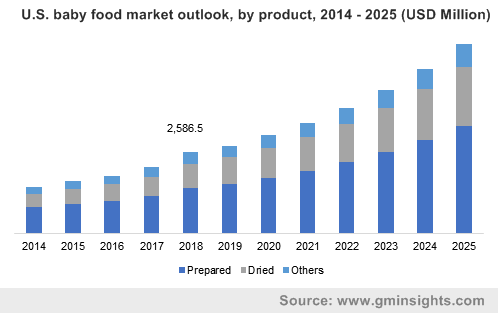Proliferating veganism trends to fuel baby food market outlook over 2019-2025, rising efforts by industry contenders for launching innovative products to define the global landscape
Publisher : Fractovia | Published Date : 2019-06-11Request Sample
The global baby food market is poised to experience commendable momentum over the ensuing years, owing to significant factors such as the growing population of infants, rise in disposable income, and the growing trend of dual income families. As babies start eating solid food when they’re about 6 months old, baby food is often the go-to option for many parents. To make the food more appealing for the baby many parents are adding a variety of flavors, textures, and colors to their infant’s diet. This has encouraged several companies to diversify their offerings to leverage the growing consumer needs.
U.S. baby food market, by product, 2014 - 2025 (USD Million)

Along similar lines, Nestle has recently disclosed plans to expand its portfolio with four new flavors of baby food in the coming days. Hence, growing efforts by the leading market partakers will impact the baby food market trends positively in the coming years.
Top trends of the baby food market are enumerated below:
Biodynamic foods
Biodynamic farming uses several principles that bring vitality to the soil and produce. This process is gaining popularity across various food categories, including baby food products. Companies like White Leaf Provisions have already forayed into the trend by introducing the first line of baby food products with 100% regeneratively farmed ingredients.
A wave of new business concepts
Startups have begun disrupting the global baby food industry with new business strategies like meal kit deliveries, technology friendly solutions, and subscription services to appeal to more millennial parents. Over the last few years, the baby food market has welcomed several new players including some well-known names like Raised Real, which offers food membership programs, and food delivery startups like Yumi and Once Upon a Farm.
Innovative packaging
Although a lot of brands have still stuck to the good old jars, some have embraced baby food pouches and reaped success from its adoption. These pouches are easy to carry and use compared to conventional tins or jars. According to the New York Times, plastic tube packaging had accounted for 25% of the baby food sales in the United States. The newfangled packaging options have mostly impacted the on-the-go snacks and liquid food segments for babies and toddlers.
A major concern for parents is to increase the vegetable intake of their kids. As is known, babies have an innate preference for sweet foods, given that they mostly feed on breast milk in their early months. Hence, several parents consider it essential to introduce vegetables prior to fruits or meat. In addition to this need, they also prefer the food to be organic and free from additives.
One company that’s helping parents introduce healthy vegetarian diets is the San-Francisco based Raised Real. The company follows a different approach to the baby food category offering direct-to-consumer food deliveries of homemade baby food products. Each of their products is expertly crafted and packed with vegetables, fruits, and micronutrients that are essential during a child’s early development stages. Not to mention, working mothers who often find it challenging to prepare home-cooked meals for their babies are the chief customers of such innovations, thereby making the rising women workforce a significant driving factor for the global baby food market growth.
With the growing number of millennial parents, veganism trend is also getting popular in baby food industry. Manufacturers are excessively capitalizing on this trend by introducing different flavors with creative plant-based combinations. Moreover, the use of organic ingredients and the absence of additive is creating an increasing demand for vegan baby food. In addition, supplementary features like innovative, recyclable, and biodegradable baby food packaging are also appealing to millennial parents who care for their toddlers as well as the planet’s wellbeing. Hence, the rapid increase in millennial population is a positive sign for the upward growth trajectory of the baby food business sphere.
Here’s a look at some baby food brands that are gaining popularity among vegan parents:
Once Upon a Farm
Each of its products are vegan and offers a range of fruits and vegetables as well as other dairy-free items such as Caroberry Mousse and Just Right Porridge.
Pumpkin Tree Snacks
The company’s line of products under the brand-name Peter Rabbit Organics offers 10 varieties of gluten-free, non-diluted, USDA Organic, and NON-GMO verified baby food that comes in BPA-free packaging.
Earth’s Best
Earth’s Best offers an extensive range of plant-based options for babies and toddlers comprising breakfast foods, snacks, and entrees in convenient packages.
Sprout Organic Foods
Sprout offers a range of vegetable, fruit, and grain blends made from ingredients procured from only certified-organic growers and includes no concentrates, GMO or preservatives.
Overall, the evolving tide of millennial parenthood will provide the baby food industry with lucrative growth opportunities in the future. Apart from this, factors like the steadily rising global population, income growth, increasing infant health concerns, and innovation in food products & packages will continue to foster market growth. A reliable research report claims that the baby food market is likely to surpass $33 billion by 2025.